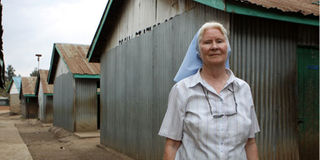Thousands face eviction from the only home they have ever known

PHOTO | STEPHEN MUDIARI A concerned Sister Mary Killeen of Mercy Development Support, walks at the school she started in the 1980s at Mukuru Kwa Ruben slums. The school is under threat of demolition.
What you need to know:
- Locals worried about a wave of brutal evictions that have left more than 100,000 people homeless since last September in nearby slums
- Slum landlords saw a golden opportunity to flatten informal settlements for which they had long held titles claiming that it was all part of the KAA drive to clear “flight paths”
- Community leader Evans Omondi “Papa” Jack urges Lands minister James Orengo to act on a promise he made in Parliament to revoke the titles
On a typical Wednesday morning in the sprawling Mukuru kwa Ruben slum to the east of Enterprise Road in Nairobi, life goes on as it always has.
Girls skip a rope while singing nursery rhymes and little boys charge around making revving sounds while pushing tyres of various sizes at full pelt.
All around them various enterprises carry on their activities: bicycle hardware shops, food stalls, mobile charging booths and sundry clothes stalls.
But on the walls of the industries that neighbour the slum, the graffiti sprayed all along the perimeter of the slum betrays the tension that is in the air about the future of the thousands of slum dwellers.
“All Land Grabbers, Come Baby Come,” reads one. Another: “Mukuru Ndio Ocha” (Mukuru is our rural home) and yet another: “Mukuru is not for Sale.”
These signs reflect the worries of locals about a wave of brutal evictions that have left more than 100,000 people homeless since last September in nearby slums.
Thrown out
The flattening of the informal settlements followed the Syokimau evictions where dozens of mainly middle class families were thrown out of land belonging to the Kenya Airports Authority.
But as those evictions were going on, some of the landlords of other slums saw a golden opportunity to flatten informal settlements for which they had long held titles claiming that it was all part of the KAA drive to clear “flight paths”.
In the process, tens of thousands were left homeless. They include more than 20,000 residents of Masai Village who were roused by bulldozers at 2am and saw their houses and livelihoods reduced to rubble by a large gang accompanied by heavily armed police officers.
The same fate befell the Kyang’ombe slum on October 22, leaving about 60,000 residents in the cold.
The 14-acre Mitumba Village was next in the sights of those carrying out the evictions leaving, according to the local campaigners, 30,025 people without a roof over their heads.
Few people feel the pain of these brutal evictions than Sr Mary Killeen, an Irish nun of the order of the Sisters of Mercy. She arrived in Kenya in January 1976 as a teacher at a middle class school in South B.
But by 1982, she grew concerned that thousands of children in the neighbouring low income settlements could not make it to public schools because of a policy requiring cost-sharing between parents and the government.
She established several schools in the slums, starting in Mukuru Kaiyaba. What she didn’t realise is that by putting up permanent structures on land eyed by well-connected grabbers, she was setting herself up for a decades-long energy sapping battle against tycoons and crooks of various shades.
Mukuru kwa Ruben is only one of the many settlements in the sights of these political operators.
On that land in Maendeleo section of the slum stands the Mukuru Ruben Centre which has a school serving 1,800 pupils from the neighbouring community, two clinics which receive up to 60,000 patients a year, a vocational training school and a basic computer school.
“It is very sad when you see wealthy people who already have so much treating thousands and thousands of poor people this way,” Sr Killeen said.
She left the school to the African Education Fund, an NGO from Japan who pulled out when they realised they couldn’t get a title deed and shelved plans to construct modern primary and secondary schools.
Now the school is run by Bro Frank O’Shea of the Christian Brothers ministry who has been waging a similarly forlorn fight for titles so they can push ahead with development plans.
The threat of eviction and lack of security of tenure makes it impossible to plough ahead with those plans.
Matters are complicated by the fact one of the allottees took a charge of a loan of more than Sh1 billion using the land’s title.
Community leader Evans Omondi “Papa” Jack urges Lands minister James Orengo to act on a promise he made in Parliament to revoke the titles.
“Here in Maendeleo there is a police post, a chief’s and assistant chief’s office, a polling centre and a Standard 8 examination centre, all of which were built with the government’s consent. It is a joke to tell us that this is private land.”
Mr Omondi recently led a demonstration to Cooperative Bank to stop a planned eviction of residents by an auctioneer. He says locals are still anxious about their future, sentiments shared by Martin Okech, the headmaster of the Maendeleo Learning Centre, which is home to 450 students not far from the Ruben Centre.
“It is wrong to pile poverty on top of poverty and multiply the desperation of these people,” Mr Okech said.




